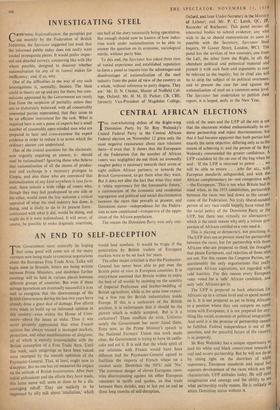INVESTIGATING STEEL
CMIMING Nationalisation, the pamphlet put out recently by the Federation of British Industries, the Spectator suggested last week that the informed public today does not really want loaded propaganda pieces. It would prefer impar- tial and detailed surveys, comparing like with like where possible, designed to discover whether nationalisation (in any of its forms) makes for inefficiency; and, if so, why.
One of the difficulties in the way of any such investigations is,' normally, finance. The State could in theory set up and pay for them; but com- missions appointed by the Government are rarely free from the suspicion of partiality unless they are, so elaborately balanced, with all conceivably interested parties represented, that they cease to be an efficient instrument for the task. What is required here is not a posse of experts but a small number of reasonably open-minded men who are prepared to hear and cross-examine the expert evidence in order to reduce it to terms which the ordinary elector can understand.
One of the crucial questions for the electorate, now urgently requiring an answer, is : should steel be nationalised? Ignoring those who believe that nationalisation of all the means of produc- tion and exchange is a necessary prologue to Utopia, and also those who are convinced that nationalisation of any kind anywhere is ipso facto mad, there remain a wide rake of voters who, though they may feel predisposed to one side or the other, would none the less welcome a critical appraisal of what the steel industry has done, is doing, and is likely to do in its present form : contrasted with what it did, would be doing, and might do if it were nationalised. It will never, of course, be possible to make dogmatic assertions, one half of the story necessarily being speculative. But enough should now be known of how indus- tries work under nationalisation to be able to answer the question on its economic, sociological merits, without party bias.
To this end, the Spectator has asked three men of varied experience and established reputation to form a panel to inquire into the advantages.and disadvantages of nationalisation of the steel industry from the point of view of the, country as a whole, without reference to party dogma. They are: Mr. D. N. Chester, Master of Nuffield Col- lege, Oxford; Mr. H. M. D. Parker, CB, CBE, formerly Vice-President of Magdalen College, Oxford, and later Under-Secretary in the Ministry of Labour; and Mr. P. C. Lamb, QC, JP, Recorder of Rochester. This panel invites all interested bodies to submit evidence; any who wish to do so should communicate as soon as possible with the Secretary, Spectator Steel Inquiry, 99 Gower Street, London, WC1. The panel has the services of two assessors, one from the Left, the other from the Right, to sift the abundant political and polemical material and present it with such facts and arguments as maY be relevant to the inquiry; but its chief aim will be to strip the subject of its political overtones, and to present the case for and against the nationalisation of steel on a common-sense level. The Spectator has undertaken to publish their report, it is hoped, early in the New Year.














































































 Previous page
Previous page